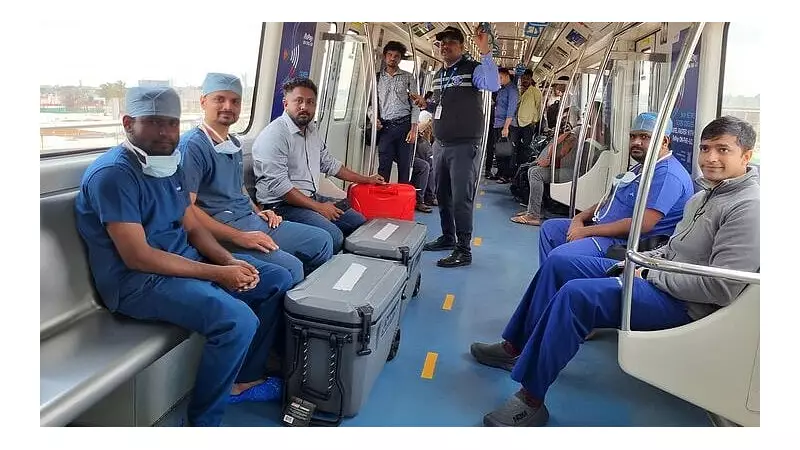
In a remarkable demonstration of urban infrastructure serving humanitarian causes, Bengaluru's Namma Metro once again proved its mettle by facilitating the rapid transport of precious human organs for life-saving transplants. The city witnessed a medical miracle unfold as a pair of lungs and a heart traveled 33 kilometers through the bustling metropolis during Thursday evening's peak hours.
The Race Against Time
The critical journey began at the Kempegowda International Airport around 6:30 PM, when the organs arrived from another city. What followed was a meticulously planned operation that saw the medical team utilize Bengaluru's metro system as their preferred mode of transport, bypassing the city's notorious traffic congestion.
The organs traveled from the airport to the Green Line's Nagasandra station, then transferred to the interchange station, and finally reached the Yellow Line's Rashtreeya Vidyalaya Road station. The entire 33-kilometer journey was completed in a record 63 minutes—a feat that would have been impossible by road during evening rush hour.
Multiple Lives Saved
The transported organs represented hope for several patients awaiting transplants. The heart was destined for a patient at Fortis Hospital, Bannerghatta Road, while the lungs were rushed to Manipal Hospital, Old Airport Road. This coordinated effort demonstrates how urban transport systems can be integrated into emergency medical services.
"This isn't the first time Bengaluru Metro has served as a green corridor for organ transport," noted a medical coordinator involved in the operation. "The reliability and predictability of metro timing make it an ideal choice when every minute counts toward saving lives."
Setting New Precedents in Medical Logistics
The successful transport highlights several key advantages:
- Time Efficiency: Metro travel eliminates unpredictable road traffic variables
- Temperature Control: Maintains stable environment for organ preservation
- Coordinated Effort: Involves metro staff, medical teams, and traffic police working in harmony
- Cost Effective: Provides reliable transport without requiring special vehicle arrangements
This incident follows a similar successful organ transport via Bengaluru Metro that occurred just last week, indicating that this method is becoming a standardized protocol for critical medical logistics in the city.
The Human Element
Behind the clinical details of organ transport lies a profound human story. For the recipients, this metro journey represented their only chance at survival. For the donors' families, it meant their loved ones' legacy would continue through others. And for the city of Bengaluru, it demonstrated how modern infrastructure can serve the most fundamental human needs.
As urban centers across India grapple with increasing traffic congestion, Bengaluru's innovative approach to leveraging existing public transport for emergency medical services could serve as a model for other metropolitan cities facing similar challenges.





